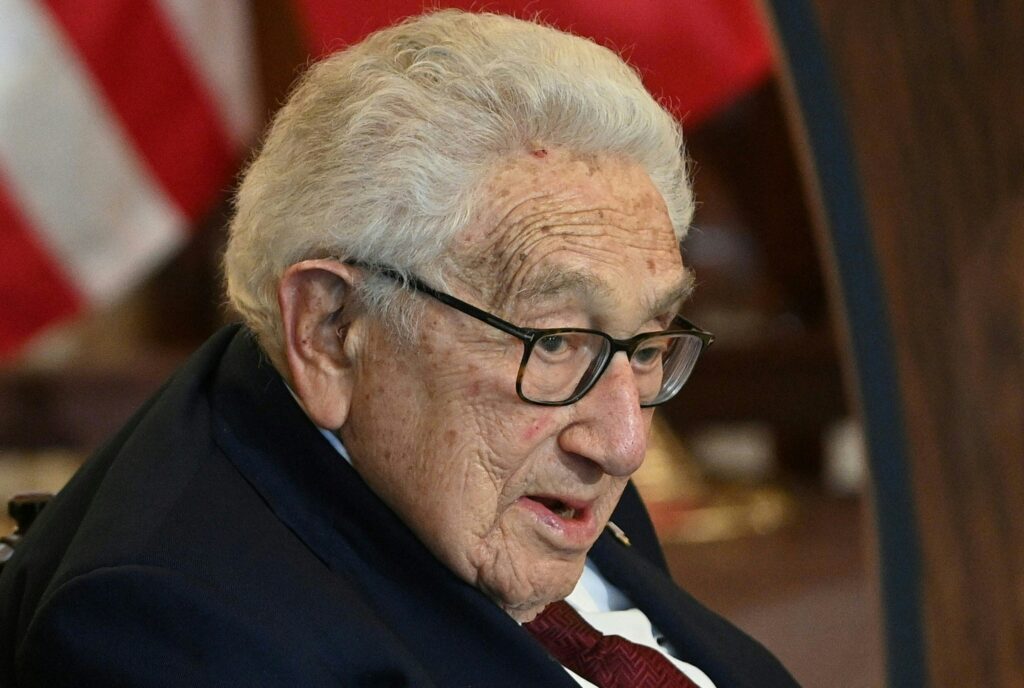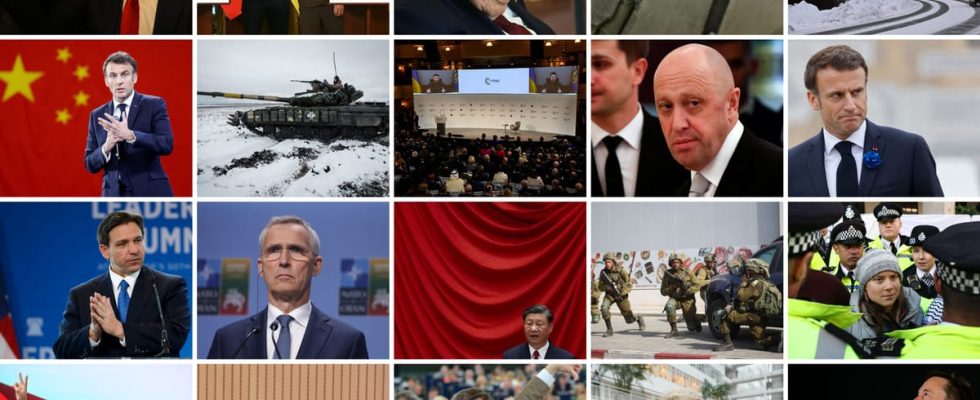Well, here we are folks, at the end of another turbulent year.
When we put this list together at the end of 2022, its contents largely covered something many of us thought we would not see again in our lifetime: a major war in Europe. Now, we are grappling with two wars in our immediate neighborhood, as the slaughter drags on in Ukraine, and conflict rages between Israel and Hamas in Gaza.
In Ukraine, the long-awaited counteroffensive against Russia, which began in June, has not been as swift and successful as the West hoped. While across the Mediterranean, Hamas’ deadly attack on Israel on October 7 marked the beginning of a highly divisive war that is threatening to turn into a regional conflict and has fueled antisemitism and Islamophobia the world over. Neither of these conflicts have an end in sight.
Beyond the battlefields, 2023 saw many other surprise twists and turns.
A submarine that went missing on its way to visit the Titanic shipwreck captivated people across the globe, England’s Lionesses brought the football Women’s World Cup home after 57 years (but an unwanted kiss by Spain’s football chief took over much of the coverage), two elections in Europe ended in shock outcomes and the U.K. managed to get through a whole year without a change in leadership (that’ll likely come next year instead).
Which POLITICO stories grabbed your attention most through it all? We look back at our 20 most-read stories of 2023.
20. A broken Netanyahu is miscalculating over Gaza, former Israeli PM says
A month into the Israel-Hamas war, former Israeli leader Ehud Olmert sat down for an exclusive interview with POLITICO — and did not mince his words on Prime Minister Benjamin Netanyahu.
Describing him as “Mr. Bullshit,” Olmert claimed the Israeli leader is in a state of “nervous breakdown” and “every minute he is prime minister is a danger to Israel.”
Read the story.
19. Mining firm: Europe’s largest rare earths deposit found in Sweden

In January, Europe’s largest known deposit of rare earth elements was found in northern Sweden. While Europeans were cheering the discovery, China may not have been. That’s because it currently provides nearly 98 percent of the EU’s supply of rare earth materials, which are key for building electric vehicle batteries and wind turbines.
Read the story.
18. Geert Wilders is the EU’s worst nightmare

In October, the man nicknamed the Dutch Donald Trump nabbed a shock win in the Netherlands’ parliamentary election, securing a victory after years of having been kept out by centrists.
The success of far-right Geert Wilders has sent a shudder through the EU institutions, not least because of a core plank of his election pitch: a referendum on leaving the EU. Nexit, anyone?
Read the story.
17. Macron’s slow but bold U-turn on Ukraine

In the lead up to and in the months following Russia’s February 2022 invasion of Ukraine, French President Emmanuel Macron was zig-zagging on how to deal with Vladimir Putin, diving down a rabbit hole of fruitless talks with the Russian leader. As one French diplomat put it: “Macron missed his Churchillian moment.”
But the French president has since picked up the mantle as one of Ukraine’s strongest allies, pledging support “until victory.”
What sparked this shift? To those paying attention, his change of tune started to become evident back in December 2022.
Read the story.
16. NATO should be ready for ‘bad news’ from Ukraine, Stoltenberg warns

Heading towards the two-year anniversary of Russia’s full-scale invasion of Ukraine, the head of the Western military alliance had somber words for the allies: We should “be prepared for bad news.”
His comments, made in early December, come as the front lines remain largely unmoved, despite Kyiv’s counteroffensive during the summer, and as Moscow boosts its troop levels.
Read the story.
15. Far-right leader Geert Wilders wins Dutch election

Very few saw the far-right Geert Wilders doing so well in this year’s parliamentary election in the Netherlands. But that’s exactly what happened in October, when masses of people backed this anti-Islam, anti-migration and anti-EU candidate.
While it’s still not clear which other parties will be willing to team up with him in a coalition, the result puts the Netherlands on track — potentially — for a dramatic shift in direction, after four consecutive centrist governments led by the country’s longest-serving Prime Minister, Mark Rutte.
Read the story.
14. China secretly sends enough gear to Russia to equip an army

This investigation, based on customs records obtained by our reporters, revealed how China is sending vast amounts of military-capable hardware to Russia, including drones, thermal optical sights, bulletproof vests and helmets.
These shipments point to a China-sized loophole in the West’s attempts to hobble Putin’s war machine.
Read the story.
13. Russia may have lost an entire elite brigade near a Donetsk coal-mining town

Only a few days after Russia’s Defense Minister Sergei Shoigu reported a “successful offensive near Vuhledar,” a Russian brigade made up of an estimated 5,000 soldiers, was wiped out, with its members killed, wounded or taken prisoner, according to Ukrainian officials.
The reports were a blow to Russian morale, with pro-Kremlin military bloggers criticizing the military’s top brass for sending elite troops into frontal attacks.
Read the story.
12. Bulgaria to the rescue: How the EU’s poorest country secretly saved Ukraine

In spring 2022, Ukraine’s army was running desperately low on the fuel and Soviet-caliber ammunition it needed to fight the Russians.
According to an investigation by our sister publication WELT, help (unbeknownst to the rest of the world) came from a surprising corner: Bulgaria.
Read the story.
11. Musk threatens ‘thermonuclear lawsuit’ as X ad boycott gathers pace

Amid an antisemitism storm around X, the social media platform’s owner, Elon Musk, threatened to file a “thermonuclear lawsuit” against non-profit watchdog Media Matters and others.
His gripe was about research that the watchdog published showing X has posted ads appearing next to pro-Nazi posts, after which companies including Disney, Apple and IBM pulled their advertising from the social media site.
Read the story.
10. Israeli official slams Greta Thunberg after she backs Palestinians in Gaza

Greta Thunberg ventured beyond her usual realm of climate activism in an op-ed published in early December to accuse Israel of committing war crimes and genocide in the Gaza Strip.
Israel immediately lambasted the Swedish poster child for environmentalism, with an Israeli army spokesperson even telling us: “Whoever identifies with Greta … is a terror supporter.”
The spokesperson later apologized, but Thunberg’s stance has led to accusations that her Fridays for Future movement has “been radicalized.”
Read the story.
9. It’s the end of the world as we know it — and Munich feels nervous

At this year’s Munich Security Conference, an annual elite global gathering in the German Alps, our chief Europe correspondent Matt Karnitschnig reported an undeniable hint of foreboding just beneath the surface.
His main takeaway: If even the Germans have woken up to the perils of the world’s current geopolitical state, this could well be the moment to really start worrying.
Read his story.
8. Sex, lies and stolen sunglasses: The 11 most embarrassing political resignations

In July, Bjørnar Moxnes, a Norwegian left-wing party leader, was caught on camera stealing a pair of luxury sunglasses from Oslo airport. Yes, really.
The humiliating incident got us thinking of other embarrassing stories that resulted in politicians resigning. Turns out, there are a lot of them.
Read the story.
7. Henry Kissinger on Hamas attacks fallout: Germany let in too many foreigners

In his last interview for a major media before his death on November 29, former U.S. diplomat Henry Kissinger said Germany had made a “grave mistake” by letting in “so many people of totally different culture and religion.”
He was responding to a question about a minority in Berlin cheering Hamas’ deadly October 7 attack on Israel.
Read the story.
6. Putin in crisis: Wagner chief Prigozhin declares war on Russian military leadership

No one thought this plot twist would actually happen. On a Friday night in June, Wagner boss Yevgeny Prigozhin became a mutineer, turning on Vladimir Putin and leading a convoy of troops towards Moscow. It thrust the Russian leader into a major military crisis. But, less than 24 hours later, the attempted coup was abruptly called off.
The reason why remains unknown. But it put a ticking time bomb on Prigozhin’s life — one that would explode exactly a month later, when the plane he was traveling on went down between Moscow and St. Petersburg.
Putin’s explanation for the crash: Intoxicated fighters who let off hand grenades on board, perhaps.
Other explanations: We’ll leave that for you to theorize.
Read the story.
5. Ron DeTedious: DeSantis underwhelms Britain’s business chiefs

Let’s just take a moment to soak in the opening of this headline, featuring one of our most-loved play on words this year.
Ok, now that’s done, just go and read the story on how this U.S. Republican presidential hopeful put on a “horrendous” performance for British business chiefs at a high-profile event in London in April.
Here it is.
4. Opposition wins Polish election, according to exit poll

After eight years of rule by the nationalist Law and Justice Party (PiS), a left-wing coalition led by former Prime Minister Donald Tusk stormed to victory in an outcome that many thought improbable.
While everyone else was making cautious calls that evening, we went bold, knowing the pre-made pacts between opposition parties would ensure they remained united behind Tusk, even when incumbent Mateusz Morawiecki would later go looking (unsuccessfully) for support to secure a majority.
Read the story.
3. Graphic videos of Hamas attacks spread on X

In the immediate aftermath of Hamas’ October 7 attack on Israel, graphic images and videos were spreading wildly on X. While gruesome material or content promoting terrorist attacks is outlawed under tech companies’ internal policies — and the EU’s own rulebook — Big Tech executives and European regulators still find themselves in a difficult position: Who determines what represents legitimate speech and what veers into jihadi propaganda?
Read the story.
2. China’s Xi goes full Stalin with purge

While the world has been distracted by war in the Middle East and Ukraine, numerous foreign policy and defense officials have vanished in China.
This Stalin-like purge is different from the endless others President Xi Jinping has carried out since his reign began in 2012, because this time, the officials being neutralized are loyalists from the inner ring of his own clique. And it’s leading to serious questions over the regime’s stability.
Read the story.
1.Europe must resist pressure to become ‘America’s followers,’ says Macron

In an interview with us on board France’s Air Force One during a trip to China, French President Emmanuel Macron urged Europeans to walk their own path and not to become “America’s followers” in world crises.
His remarks triggered deep concern over the future of the transatlantic alliance, at a time when the U.S. is providing the lion’s share of military assistance to Ukraine, and Communist China is making increasingly bellicose moves on Taiwan.
But another part of our interview also grabbed attention: The note we included at the end, outlining the Élysée Palace’s insistence on “proofreading” all the president’s quotes.
Read the story.

